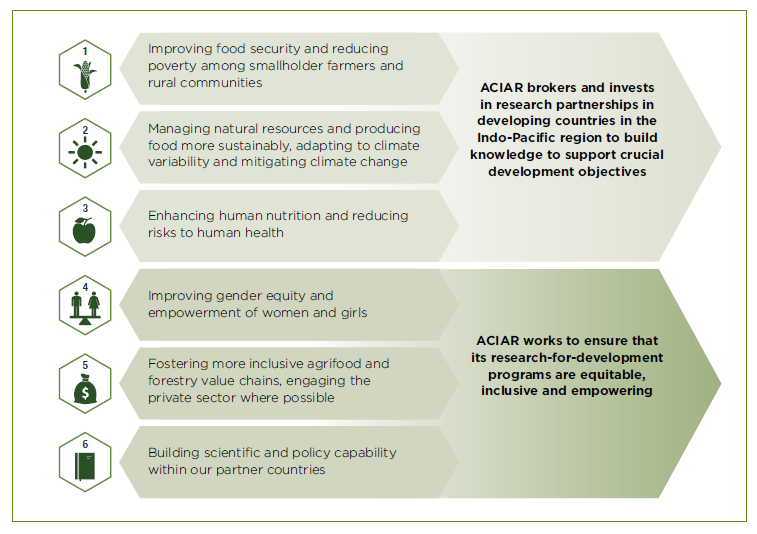- HomeHome
-
About ACIAR
- Our work
- Our people
-
Corporate information
- ACIAR Audit Committee
- Commission for International Agricultural Research
- Policy Advisory Council
- Agency reviews
- Executive remuneration disclosure
- Freedom of information (FOI)
- Gifts and benefits register
- Information publication scheme
- List of new agency files
- Contracts
- Legal services expenditure
- Privacy impact assessment register
- Commonwealth Child Safe Framework
- Benefits to Australia
- Careers
- 40 years of ACIAR
-
What we do
- Programs
- Cross-cutting areas
- Resources
- Where we work
-
Funding
- Research projects
- Fellowships
-
Scholarships
- John Allwright FellowshipScholarships to study in Australia for ACIAR partner country scientists to have Australian postgraduate qualifications
- ACIAR Pacific Agriculture Scholarships and Support and Climate Resilience Program
- Alumni Research Support Facility
- Publications
- News and Outreach
Our work
As world leaders in agricultural research, Australian scientists are encouraged and supported to use their skills for the benefit of partner countries while at the same time contributing to solutions to meet Australia’s own agricultural challenges.
The diversity of our own agriculture sector, which extends from the tropics to the arid zone, continues to thrive while operating in highly variable and challenging climates with minimal external subsidies. This suggests the Australian agriculture sector has valuable knowledge and expertise to share with other countries facing similar challenges, including farmers, rural poor, consumers, researchers and policymakers.
ACIAR supports research projects in four regions—eastern and southern Africa, East and South-east Asia, the Pacific and South Asia. Our research projects focus on agribusiness, climate change, crops, fisheries, forestry, horticulture, livestock systems, social systems, soil and land management and water. They deliver specific development outcomes.
To date, ACIAR has commissioned and managed more than 1,500 research projects in 36 countries, partnering with 150 institutions along with more than 50 Australian research organisations.
How we work
We broker, facilitate, invest in and manage strategic partnerships with public and private research institutions to improve the productivity and sustainability of agricultural systems and the resilience of food systems in partner countries.
ACIAR identifies opportunities and partnerships to undertake international agricultural research and capacity-building but does not undertake research directly.
Our efforts contribute significantly to Australia’s aid program and the achievement of its goals.
The collaborative international programs and partnerships underpinning ACIAR-supported research also improve the productivity and sustainability of agricultural systems in Australia.
ACIAR-supported projects are designed to produce specific research outputs that translate to development outcomes. Our six high-level objectives include:
Read more in the ACIAR 10-Year Strategy 2018-2027.



